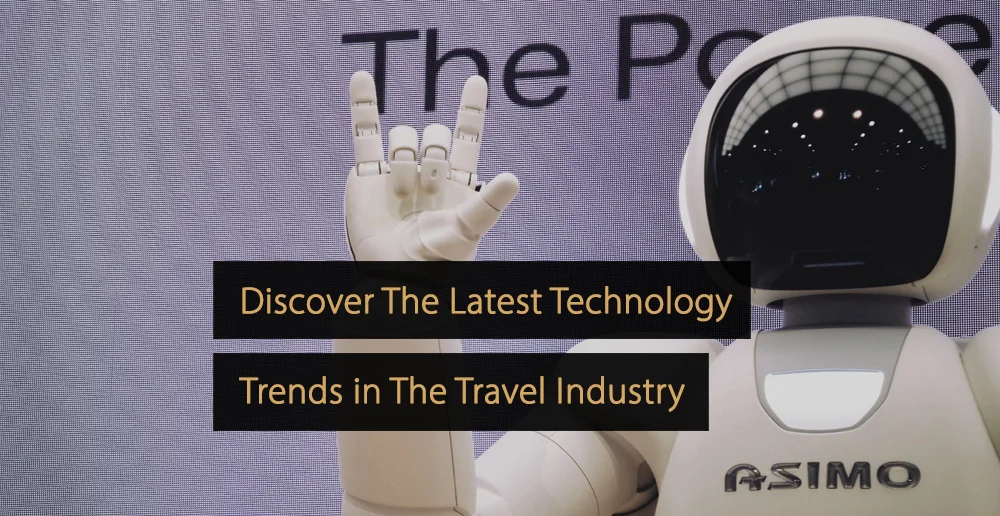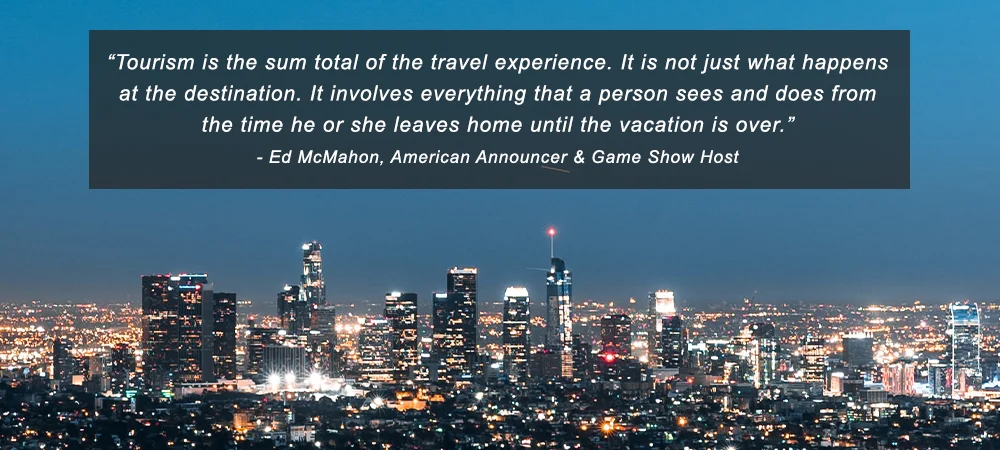Technology is crucial to the tourism and travel industry, helping businesses with day-to-day operations while improving the customer experience. For this reason, hotels, airlines, restaurants, and other companies must keep up with the latest technology trends within the travel industry. In this article, you can learn more about the new travel tech trends of 2025.
Table of Contents:
- What is Travel Technology?
- Why Should You Keep Up With the Latest Tourism & Travel Technology Trends?
- Which Developments Are Responsible for the Latest Travel Tech Trends?
- Discover The Latest 15 Technology Trends in the Hospitality Industry in 2025
- 1. Sustainable Technology Trends in the Travel Industry
- 2. Artificial Intelligence (AI)
- 3. Big Data
- 4. Blockchain Technology
- 5. Robots
- 6. Voice Search & Voice Control
- 7. Augmented Reality (AR)
- 8. Virtual Reality (VR)
- 9. Internet of Things (IoT)
- 10. AI Chatbots
- 11. ChatGPT Use in the Travel Industry
- 12. CyberSecurity Measures
- 13. Recognition Technology
- 14. Virtual AI Assistants
- 15. Advanced Metasearch Engines
- 16. Metaverse & Travel
- 17. NFTs Enter the Travel Industry
- 18. Contactless Payments
- 19. Enhanced Booking and Travel Planning
- 20. 5G and Advanced Wi-Fi
- 21. Self-Driving Vehicles
- What Are the Latest Trends in Travel Marketing?
- What Are the Latest Trends in Tourism?
- Learn More About Tourism & Travel Tech During Tourism Courses
- Find a Travel Tech Job With These Job Boards
What Is Travel Technology?
Travel technology is a broad term that is used to describe the application of IT, e-commerce, and similar technology solutions within the fields of tourism, travel, and hospitality. Hotel and tourism technology may be intended to assist businesses and their employees, improve the travel experience for customers, or both.
Ultimately, the goals or motivations behind implementing travel technology include automating travel and related processes, saving time, reducing costs, and creating a more seamless travel experience for consumers. Technology can be deployed to enhance the customer experience before, during, and after the trip.
Why Is Travel Technology Important for Businesses in Tourism & Travel Industry?
Travel technology can help businesses streamline or even automate processes traditionally requiring active human involvement. This can help a business reduce staffing requirements, cut costs, and increase the income it generates, leading to improved financial results.
In addition, technology can assist businesses through improved accuracy and convenience while helping reduce or eliminate human error. However, it is essential to always keep up with the latest tourism technology trends so that the best solutions are being used and that other businesses do not gain a competitive edge.
Table: Role & Impact of Travel Technology in Tourism & Travel Industry
Why Should You Keep Up With the Latest Tourism & Travel Technology Trends?
Businesses should always keep up with the latest travel technology trends because your main competitors will too. This means you risk giving them a significant advantage if you allow them to adopt new technology. At the same time, you rest on your laurels, especially if the technology is designed to benefit customers.
As trends emerge and new technology becomes established, customers expect a certain level of experience and want the convenience associated. Customers will likely feel disappointed if your business fails to meet these expectations. This could then, in turn, lead to negative reviews and damage to your reputation.
At the same time, keeping up with travel and tourism technology trends can also help employees and may make recruitment easier, as candidates will want to work with the latest tools, especially if it can reduce stress.
Which Developments Are Responsible for the Latest Travel Tech Trends?
A trend can be defined as a general development within a particular field or as a general shift in behavior. Within hospitality, several factors are responsible for changes in consumer behavior and, therefore, are responsible for many of the most relevant travel tech trends.
Emerging technology, including voice search, virtual and augmented reality, facial recognition technology, and the Internet of Things, has led to the adoption of smart speakers in hotels, virtual reality tours from travel companies, and new, seamless ways to check-in, without having to queue and speak to reception staff.
Within our personal lives, we increasingly use contactless payments, voice search, and mobile solutions, so it makes sense that tourism technology trends have followed this same basic pattern. The COVID-19 pandemic also accelerated some of these behaviors, increasing the need for contactless solutions.
Discover The 21 Key Technology Trends in the Tourism & Travel Industry
We piled up the latest and newest technology trends in tourism and travel, along with tech trends for 2025.
1. Sustainable Technology Trends in the Travel Industry
Many of the technology trends travel industry leaders need to be aware of are influenced by the issue of sustainability. The sections below cover some of the most important sustainable technology trends.
Sustainable Fuel for Cruise Ships
Among the emerging technology trends for travel industry figures to focus on is the shift towards more sustainable fuel within the cruise industry. An example of this that is already in use is the move to renewable biofuels, while it is anticipated that there will be a significant shift to partially battery-powered hybrid ships in the years to come.
On top of this, there is substantial interest in green hydrogen and green methanol fuels. All of these options provide the potential for the cruise industry to reduce its carbon footprint, which will appeal to environmentally-conscious travelers.
Video: Alternative Fuels in Shipping
Sustainability Technology in the Airline Industry
Like in the cruise industry, airlines are facing growing customer apprehension about the environmental sustainability of their services. According to the CO2 Emissions Report by the International Energy Agency, aviation accounted for 2% of global energy-related CO2 emissions in 2022. This is driving a new era of sustainability technology in the industry, and one of the major technology trends travel industry marketers are promoting is the use of more sustainable aircraft.
Some of these aircraft are already being powered by biofuels, which help to reduce the environmental impact of each flight. Beyond this, the aviation industry at large is exploring electric aircraft, the possibility of using hydrogen fuel, and options to shift towards hybrid fuel so that customers can fly with greater confidence.
Video: Electric Plane Example
Renewable Energy in the Hospitality Industry
Renewable energy ranks highly among the technology trends that travel industry and hospitality industry leaders are interested in. This includes wind power, solar power, hydropower and biomass. While these solutions can be expensive to implement, the hospitality industry is becoming more willing to spend money in this area for several reasons.
Firstly, it presents an opportunity to appeal to the ever-growing number of ethical travelers who actively avoid unsustainable travel. Secondly, it can help hospitality companies to win favor in the local area by minimizing the consumption of resources. Thirdly, there are long-term cost-saving opportunities on offer.
Video: Hotel Sustainability Basics
2. Artificial Intelligence (AI)
Aside from robots, artificial intelligence is also being used in other ways. And it’s only expected to grow – according to the Artificial Intelligence (AI) Market Size Worldwide Report by Statista, the market size of artificial intelligence is projected to grow to $420 million by 2025. Perhaps the most obvious use within the travel and tourism industry is for customer service purposes, with chatbots possessing the ability to deliver rapid response times to problems or queries. It is also able to continuously learn from interactions with customers.
In addition, hotels and other companies operating in the tourism industry can use artificial intelligence to accurately and continuously sort through data. It can draw conclusions about business performance or trends associated with customer satisfaction and even intelligently manage inventories.
Example: Create Your Bot Booking Travel
Find more detailed information and examples about artificial intelligence use cases in the travel industry in the article “How Artificial Intelligence is Changing the Travel Industry.”
3. Big Data
In modern tourism management, big data is a fact of life, and almost all successful companies employ their own data collection techniques. One of the biggest uses for this data is to improve personalization, with travel companies using the information they gather to make specific adjustments to their offerings.
Another valuable use of data is to analyze current business performance. In particular, hotel owners can use big data for revenue management purposes, using historical occupancy rates and other past trends to better anticipate levels of demand. When demand is predictable, pricing and promotional strategies can also be optimized.
Example: Big Data and predictive analysis
Find more detailed information and examples of big data in the travel industry in the article “Ways Big Data Can Benefit the Travel Industry.”
4. Blockchain Technology
Blockchain technology refers to a decentralized system for recording transactions using a public ledger. A blockchain is a list of records that are cryptographically linked to each other in an irreversible chain.
The rise of blockchain is one of the main technology trends travel industry businesses need to be aware of because blockchain technology can help to ensure transactions are safe, transparent and secure. This, in turn, can enhance trust.
Blockchain technology underpins various cryptocurrencies, including Bitcoin, providing additional payment options to explore. It can be used for everything from recording bookings to managing customer loyalty programs.
5. Robots
Robotics technology is one of the most exciting forms of travel technology, and it is constantly improving. Within hotels, for example, robots have been used in concierge-like roles, helping to greet guests when they arrive and provide information. Some hotels have expanded their use further, involving them in cleaning and luggage handling.
Within restaurants, robots can potentially have a role in food preparation and food service. In airports, they can detect concealed weapons, while some manufacturers also use robotics to create luggage cases that intelligently follow you. Moreover, travel agents use robots for pre-screening, making waiting times more productive for customers.
As with many other technology trends within the travel industry, the use of robots has increased in response to COVID, especially as they have the potential to reduce human-to-human contact.
Video: Robots Take Over Luggage Duties
Example: Autonomous Security Robots for Airports
Find more detailed information and examples of robot use cases in the travel industry in the article “Robots in the Travel Industry: 8 Real-World Examples.”
6. Voice Search & Voice Control
Smartphones, smart speakers, and AI assistants have all helped to increase the relevance of voice search as far as technology trends in the travel industry are concerned. In particular, a growing number of travel customers are using voice search to find and book airline tickets, hotel rooms, and travel experiences.
It is, therefore, crucial to design your website with voice search in mind so that you can capitalize on this trend.
On top of this, voice control is also playing a growing role in actual travel experiences too. Within hotel rooms, voice-controlled devices can be used to control lighting and heating within rooms, or to obtain tourist information without needing to speak to a member of staff. This is likely to continue to expand into other areas of the industry too.
Video: Book Your Travel Trip With Voice Search
Take a look at “How Can Voice Control Benefit the Travel Industry?” to learn more about controlling devices by voice.
7. Augmented Reality (AR)
Augmented reality is similar to virtual reality, but involves augmenting a person’s real surroundings, rather than replacing them. One of the major plus points of this particular technological trend is that it is cheaper than VR, with users requiring only a smartphone or tablet device with internet access.
Through graphical overlays, those in the tourism industry can greatly enhance the customer experience, providing customers with valuable information or even pure entertainment. For instance, apps can allow photographs to be augmented through filters and effects. Details about local destinations can also be displayed as a customer points their smartphone at them, providing information at the exact time that it is most relevant.
Example: Augmented reality within the travel industry
Find more detailed information and examples about how augmented reality can benefit your business in the article “How Augmented Reality is Revolutionising the Travel Industry.”
8. Virtual Reality (VR)
Virtual reality has been an emerging technology in a number of different sectors, but its role within the tourism industry is especially significant. After all, it provides travelers with the ability to experience far away locations from the comfort of their own home, and can be the difference in whether they ultimately complete a booking.
Using VR tours, customers can experience everything from virtual hotels tours and restaurants to landmarks, national parks or even specific activities. The interactivity and immersion can also help to provide you with a competitive advantage over rivals who are not yet making the most of these kinds of tech trends. Most VR tours or 360 tours are now compatible with mainstream web browsers and can help those still reluctant to travel see the benefits more clearly.
Example: 360° VR Tour of New York City: The City That Never Sleeps
Example: The World’s First Virtual Reality Travel Search and Booking Experience
Read the articles “How Virtual Reality is Transforming the Travel Industry” and “Benefits of Virtual Reality Marketing for The Travel Industry” for more information.
9. Internet of Things (IoT)
One of the most exciting emerging travel technology trends is the Internet of Things (IoT), which involves internet-based interconnectivity between everyday devices, allowing them to both send and receive data. We already see examples of its role within the travel and tourism industry, and this will only increase.
For instance, IoT technology can be used in hotel rooms to provide customers with a device that connects to everything from the lights, to the heaters and air conditioning, allowing all to be controlled from one place. In airports, meanwhile, luggage cases can be installed with sensors that will alert passengers when they pass by.
Example: Smart Technology Smarter Airports
Find more detailed information about the ‘Internet of Things’ in the travel industry in the article “How the Internet of Things (IoT) Can Benefit the Travel Industry.”
10. AI Chatbots
AI-powered chatbots can be one of the single most sensible travel technology investments you can make because these chatbots can provide customers with swift answers to questions on a 24/7 basis, regardless of staff availability. This can be essential for living up to current expectations of customer service.
Typically, these chatbots are at their best when answering common questions which have standard answers. Yet, advances in AI technology mean modern chatbots continually improve as they have more and more interactions. They can also be especially good at responding to queries about policies and other measures or procedures.
Example: Example Friendly Travel-Intelligent Chatbot
Check out the articles “AI Chatbot: What Are the Advantages for the Travel Industry?” and “AI Bot: Which Features Are Important for Travel Companies?” to learn much more.
11. ChatGPT Use in the Travel Industry
The use of ChatGPT is one of the technology trends travel industry leaders simply must familiarize themselves with. ChatGPT is an AI-powered tool that responds intelligently to user prompts. It can be used for tasks ranging from answering simple user questions to automatically generating entire articles or blog posts.
In the “ChatGPT Travel Guide: How the Travel Industry Can Benefit!“ article, you will have the opportunity to learn about how ChatGPT is being used throughout the industry to improve customer satisfaction, reduce costs, improve booking experiences, assist with personalization, aid with data analytics, and much more.
12. CyberSecurity Measures
Cybersecurity is a major focus area for those in travel management roles because companies in the industry are increasingly at risk from cyber-attacks and more vulnerable to other kinds of data breaches. Travel companies are a major target because they employ many people and have access to abundant customer data.
Some of the biggest threats in this area include phishing attacks and ransomware attacks, although the modern reliance on data also leaves companies at risk from human error caused by their own employees. This requires investment in cybersecurity training and various hardware and software solutions to keep your business safe.
It is also important to keep up with the latest regulations and to comply with data protection laws.
13. Recognition Technology
Finally, recognition technology is especially interesting within this list of key tech trends, due to its potential for removing friction from purchases and making interactions seamless. The technology itself includes fingerprint recognition, facial recognition, retina scanning, and various other biometric identifiers.
Such technology is already being used in some hotels to allow access to rooms via fingerprints or to allow for semi-contactless check-outs. However, in the future, it is hoped that this technology may allow customers to pay for meals in the hotel restaurant simply by walking through the exit.
Example: Facial Recognition Check-in in Marriott China
In the article “Ways Facial Recognition Can Be Used in the Travel Industry“, find more detailed information and examples of facial recognition use cases in the travel industry.
14. Virtual AI Assistants
Modern virtual assistants use conversational AI technology to respond to user commands. Within the travel industry, this technology can be used by customers to book tickets, make reservations, or seek valuable tourist information.
AI-powered virtual assistants have become one of the most significant technology trends in travel industry businesses, making it easier for travelers to find useful information, activate devices and perform other key tasks.
Many of these virtual assistants have the ability to reduce staff workloads by answering basic questions rapidly too. Some of the biggest examples of virtual assistants include Apple’s Siri, Amazon’s Alexa and Google Assistant.
15. Advanced Metasearch Engines
Metasearch engines are data retrieval tools, which source information from multiple search engines. Within the travel industry, they are often used to provide up-to-date availability information on travel websites.
For example, a user may turn to a metasearch engine to find hotels, flights, restaurants, or travel packages. These systems often make it relatively easy to compare products and services, including their prices. Travel industry businesses also need to get to grips with metasearch-related technology trends in the travel industry. Understanding how the technology works makes it easier to optimize listings so you rank high up on results pages.
16. Metaverse & Travel
Another of the technology trends travel industry businesses need to be aware of is the growth of the metaverse. This expands upon virtual reality and augmented reality technology, providing a digital environment where social interactions can take place.
This allows users to interact with others while exploring digital recreations of travel destinations. In the article “Metaverse Travel: How the Metaverse Will Change the Travel Industry“, you can explore this topic in greater depth and learn about the impact that metaverse technology already has on travel.
Video: Tourism of the Future
17. NFTs Enter the Travel Industry
NFTs are a significant technology trend in general, but also one of the technology trends travel industry stakeholders must become familiar with. NFTs are digital assets on the blockchain and represent unique digital items.
NFTs are often associated with digital art, and some in the industry are already partnering with local artists in mutually beneficial ways, but the technology can also power customer loyalty schemes too. In the article “NFT Travel: Learn About NFT Technology in the Travel Industry“, you can gain a complete overview of NFT technology and learn about how it is being deployed within the travel industry.
18. Contactless Payments
Another important form of travel tech is the ability to accept contactless payments. This will allow travel companies to process payments much more quickly, including when customers do not have access to cash or their credit or debit cards. It can also enhance the customer experience because it is a time saver.
The availability of contactless payments started as a convenience, but it has emerged as a key part of tourism marketing in the wake of the coronavirus pandemic. With travelers nervous about the spread of the virus, many are reluctant to handle cash. Using contactless payments as much as possible can also protect your staff.
Video: Contactless Payments – How Does it Work?
Check out “Reasons why Contactless Payments are Becoming Popular Within the Travel Industry” for further insights.
19. Enhanced Booking and Travel Planning
Booking and travel planning are experiencing a revolution, too, thanks to AI, virtual reality technology, and other key technology trends in the travel industry. This is making booking and travel planning more personalized.
A growing number of travel businesses now provide tools allowing guests to explore environments while they book, using 360-degree videos. It is also now common to see AI chatbots integrated into planning and booking engines.
This seamless blending of technologies creates enhanced booking and planning processes, with tailored recommendations, intelligent upselling and cross-selling, and efficient planning based on specific preferences. Some of these systems are also able to continually learn over time, improving effectiveness the more they are used.
20. 5G and Advanced Wi-Fi
5G is the fifth generation of cellular network technology, providing faster wireless internet connectivity for smartphones. This, combined with advanced Wi-Fi technology, is helping to revolutionize internet and communication technology.
Travelers using 5G technology can more easily access online services, including smartphone apps, maps, and review platforms. More advanced Wi-Fi can also improve internet connectivity in hotels, restaurants, and airports. Wi-Fi 7 is one of the most exciting emerging technology trends for travel industry leaders, providing faster transmission rates and lower latency. This can improve the experience of streaming video content or using demanding smartphone apps.
21. Self-Driving Vehicles
Autonomous or self-driving vehicles are vehicles that are able to travel from one location to another without a human driver. They typically use a combination of AI technology, sensors and GPS technology to safely navigate roads.
It is one of the most innovative technology trends disrupting the travel industry. Self-driving vehicles have the potential to completely transform aspects of travel, such as airport transfers, taxi services, bus services and more.
While this technology is still emerging, there are promising signs that it can actually enhance safety too, reducing the number of accidents on the road by circumventing human error, tiredness, distractions and concentration issues.
What Are the Latest Trends in Travel Marketing?
Aside from staying up to date with the latest travel technology trends, you should also keep pace with the latest trends in travel marketing too. There is a significant cross-over between travel and tourism technology, with examples including virtual reality marketing and voice search marketing, but there are also specific marketing trends too.
Check out “The Latest Travel Marketing Tips to Optimise Your Results” if you are interested in exploring the topic of travel marketing in greater detail and learning about some of the major travel marketing trends right now.
What Are the Latest Trends in Tourism?
Much of the popular travel technology has been influenced by wider tourism and travel trends. For instance, the trend of environmentally conscious travel has influenced the rise of electric vehicle hire, while the trend for greater personalization has influenced the increased use of IoT devices within hotel rooms.
Read the “Tourism Trends: The Latest Opportunities for The Tourism Industry” article if you would like to learn a lot more about emerging tourism trends and the opportunities linked to them.
Learn More About Tourism & Travel Tech During Tourism Courses
Enrolling in a tourism course is one of the best ways to learn about travel technology and its various applications. There is a wide range of options available, depending on what area of tourism you would like to specialize in, with examples including travel & tourism, leisure & tourism, tourism marketing, and tourism management.
Explore “Tourism Course: A Complete Overview of Courses & Tourism Educators” to learn about the various courses available, what they cover, the benefits of studying a tourism course, a list of educators that offer these courses, and some of the best websites to visit when searching for a course that suits your requirements.
The Best Tourism Industry Job Boards
Travel technology plays a role in a variety of tourism jobs, and technology can also be used to find a job too. Whether you are at the beginning of your career or already experienced in the industry and looking to progress, tourism industry job boards can be extremely useful when searching for vacancies and applying for a new job.
Read “Tourism Jobs: The Best Tourism Industry Job Boards for Your Career”, where you can access important information about tourism jobs, along with a list of job boards that list airline, hospitality, and cruise industry positions.
Technology Trends Travel Industry FAQs
For companies operating in the travel industry, keeping up with the latest travel technology trends is essential. Understanding and adopting the trends outlined above will allow you to provide a better customer experience and can also help you optimize revenue management and overall business performance.
Want to Learn More About Technology in Related Industries?
It is essential to be aware of all the upcoming technological trends in the hospitality & tourism-related industries. While some trends can affect multiple industries, some are very specific for the industry. In the following articles, you can learn more about technology trends in related industries.
- Hotel Technology Trends: Upcoming Innovations You Must Know
- The Latest Technology Trends in the Hospitality Industry
- Latest Restaurant Technology Trends You Need to Know About
- ChatGPT Hotel Guide: Learn How Hotels Can Benefit from ChatGPT!
- ChatGPT Hospitality Guide: How ChatGPT Can Help the Hospitality Industry
- ChatGPT Tourism Guide: How the Tourism Industry Can Benefit!
More Tips to Grow Your Business
Revfine.com is the leading knowledge platform for the hospitality and travel industry. Professionals use our insights, strategies, and actionable tips to get inspired, optimize revenue, innovate processes, and improve customer experience.Explore expert advice on management, marketing, revenue management, operations, software, and technology in our dedicated Hotel, Hospitality, and Travel & Tourism categories.
This article is written by:
Hi, I am Martijn Barten, founder of Revfine.com. With 20 years of experience in the hospitality industry, I specialize in optimizing revenue by combining revenue management with marketing strategies. I have successfully developed, implemented, and managed revenue management and marketing strategies for individual properties and multi-property portfolios.













Thank you for sharing this insightful blog about tourism & travel technology. Technology is really involving in the travel industry and will soon become widespread in this industry.
Thank you for sharing this insightful blog about tourism & travel technology; in recent years, transportation has also become a vast market that embraces technology (E.g., ride-sharing apps like Uber and Lyft).
Hi, thanks for the detailed information about technology within the travel and tourism industry. I would like to know more about Big Data.
Thank you for sharing this wonderful blog about technology trends in travel and tourism. Every detail is explained very well.
Thank you for an insightful article. You have provided detailed information on technology trends in the travel and hotel industry. I enjoyed reading your article.
Thank you for sharing such an interesting blog about technology in tourism. The information is explained very well.
Thank you for sharing such a wonderful article about tech in the tourism and travel industry. Every detail is explained very well.
This blog article gives an interesting overview of how technology has changed the travel business. The author does a great job of explaining difficult ideas in simple terms so that anyone can comprehend them. I thought the author made some valid points about how AI and chatbots are altering the trip experience. I think anyone interested in travel’s future should read this article because it’s interesting and well-researched.
Thank you for sharing this blog about technology in the travel and tourism industry. Each and every detail is explained very well.
Where can I find the publish date for this article?
The Revfine.com team has written the article. The article is updated on a regular base.
This article examines many technological tendencies that are influencing the travel sector. This article investigates how technology is reshaping the travel industry and offers insights into emerging trends and the influence those trends have on travelers. Discussions on particular technologies, personal experiences with technology in travel, or any insights offered by readers regarding the changing face of the business may be included in the comments area of this article.
Thank you for sharing these new travel tech trends. Every item is explained very well.
I had no idea the travel industry was undergoing such a massive transformation! The rise of AI-powered chatbots and voice-activated booking systems is incredibly exciting, and I can only imagine how much more convenient and personalized travel experiences will be in the future.